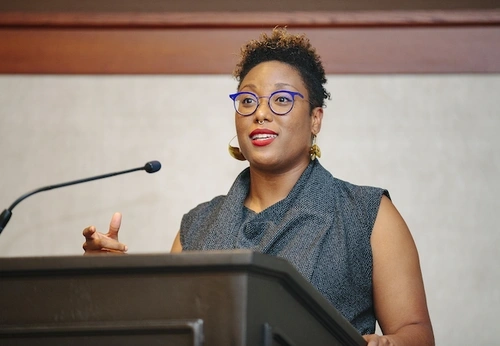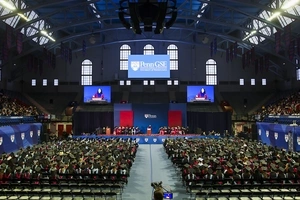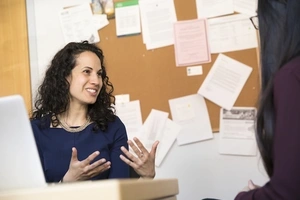Faculty Expert
-
Howard C. Stevenson
Constance Clayton Professor of Urban Education
Human Development and Quantitative Methods Division

Is the metaverse doomed to perpetuate real-world racial and social inequalities, or can the digital doppelgänger of physical space be a more equitable place?
Dr. Courtney D. Cogburn, Associate Professor of Social Work at Columbia University School of Social Work, joined the Racial Empowerment Collaborative at Penn GSE to consider this and other pressing questions about the role of virtual reality, artificial intelligence, and other emerging technologies in changing racial biases as the speaker for the 23rd Constance E. Clayton Lecture.
The evening kicked off with performances from musical guest City Love and poet Kairi Suswell, before Dr. Howard Stevenson, the Constance Clayton Professor of Urban Education at Penn GSE, and Dr. Constance E. Clayton welcomed guests.
"If we don’t imagine, who’s doing it for us? Whose imagination and reality are we living in?"
Cogburn’s talk, “UNTETHERED: Black Futures in the Metaverse,” delved into her research exploring the intersection of Blackness and emerging technologies. She drew on prominent Black scholars and Afrofuturism, reflected on her past work, and shared the new directions her scholarship is moving in.
In particular, Cogburn highlighted her work with 1000 Cut Journey, a virtual reality, or VR, experience. After donning VR headsets, participants “become” Michael Sterling, a Black male, and experience several defining moments of racism in his life.
1000 Cut Journey grew out of the idea of being able to walk a mile in someone else’s shoes, Cogburn explained. That idea was baked into the process; for example, the video crew interviewed Black people about times they encountered racism as part of their development process.
The metaverse, a concept that has been in the news recently with Facebook renaming the company “Meta,” is often misunderstood. Cogburn defines the metaverse as a translation of the physical world into the digital space. For example, the Constance Clayton Lecture itself could be recreated in the digital space, with participants represented as avatars.
While not everyone is interested in being a part of the metaverse, we can’t ignore it, warns Cogburn, because it is being actively created, often by “people who are not us and who don’t look like us.”
“If we don’t imagine, who’s doing it for us? Whose imagination and reality are we living in?” she asked.
The Annual Constance E. Clayton Lecture honors Dr. Connie Clayton, who earned her Ed.D. in Educational Administration from Penn GSE in 1981. Dr. Clayton, who began her career in Philadelphia as a teacher, went on to serve as Superintendent of the School District of Philadelphia from 1983 until her retirement in 1993, where she was known for tackling the district’s difficult budget without cutting student services, attracting local businesses to help equip schools with better resources, and establishing schools as the center of their communities.







